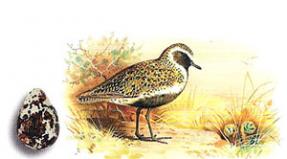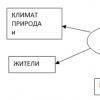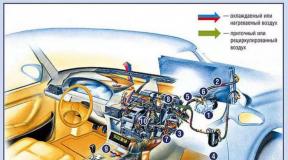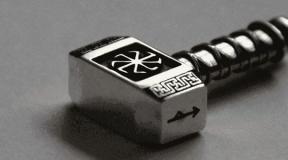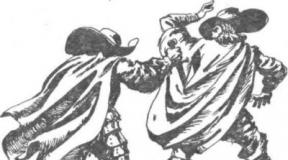Kutuzov Mikhail Illarionovich - Russian military leader - facts from life and much more
There are few people in the world who do not know for what merits Mikhail Illarionovich received laurels of honor. This brave man was praised not only, but also by other geniuses of literature. The field marshal, as if possessing the gift of foresight, won a crushing victory in the Battle of Borodino, saving the Russian Empire from plans.
Childhood and youth
September 5 (16), 1747 in the cultural capital of Russia, the city of St. Petersburg, at Lieutenant General Illarion Matveyevich Golenishchev-Kutuzov and his wife Anna Illarionovna, who, according to documents, came from the family of a retired captain Bedrinsky (according to other information - the ancestors of a woman Beklemishevs were nobles), a son was born, named Mikhail.
Portrait of Mikhail Kutuzov
However, there is an opinion that the lieutenant had two sons. The second offspring was called Semyon, he allegedly managed to get the rank of major, but due to the fact that he lost his mind, he was under the care of his parents until the end of his life. Scientists made such an assumption because of a letter written by Mikhail to his beloved in 1804. In this manuscript, the field marshal said that upon arrival to his brother he found it in its previous state.
“He talked a lot about the pipe and asked me to save him from this misfortune and became angry when he began to say that there was no such pipe,” Mikhail Illarionovich shared with his wife.
The father of the great commander, who was an ally, began his career under. Graduated from military engineering Educational establishment, began to serve in the engineering troops. For his exceptional intelligence and erudition, contemporaries called Illarion Matveyevich a walking encyclopedia or a "reasonable book."

Of course, the parent of the field marshal made a contribution to the development of the Russian Empire. For example, even under Kutuzov Sr., he made a layout of the Catherine Canal, which is now called the channel.
Thanks to the project of Illarion Matveyevich, the consequences of the flood of the Neva River were prevented. Kutuzov's plan was carried out during the reign. As a reward, the father of Mikhail Illarionovich received a gift from the ruler golden snuffbox, adorned with precious stones.

Illarion Matveevich also participated in the Turkish war, which lasted from 1768 to 1774. From the side of the Russian troops, Alexander Suvorov and commander Count Pyotr Rumyantsev commanded. It is worth saying that Kutuzov Sr. distinguished himself on the battlefield and gained a reputation as a person versed in both military and civil affairs.
Mikhail Kutuzov's future was predetermined by his parents, because after the young man graduated from home schooling, in 1759 he was sent to the Artillery and Engineering Noble School, where he showed outstanding abilities and quickly advanced career ladder. However, one should not exclude the troubles of the father, who taught artillery sciences in this institution.

Among other things, since 1758 in this noble school, which now bears the name of the Military Space Academy. A.F. Mozhaisky, a scientist-encyclopedist lectured on physics. It is worth noting that the talented Kutuzov graduated from the academy as an external student: thanks to his extraordinary mind, the young man spent a year and a half on the school bench instead of the prescribed three years.
Military service
In February 1761, the future field marshal was awarded a matriculation certificate, but remained within the walls of the school, because Mikhail (with the rank of ensign engineer), on the advice of Count Shuvalov, began to teach mathematics to students of the academy. Further, a capable young man became the adjutant wing of Duke Peter August of Holstein-Beck, managed his office and showed himself to be a diligent worker. Then in 1762 Mikhail Illarionovich rose to the rank of captain.

In the same year, Kutuzov became close to Suvorov, because he was appointed commander of the Astrakhan 12th Grenadier Regiment, which at that time was commanded by Alexander Vasilyevich. By the way, Pyotr Ivanovich Bagration, Prokopy Vasilyevich Meshchersky, Pavel Artemyevich Levashev and other famous personalities served in this regiment at one time.
In 1764, Mikhail Illarionovich Kutuzov was in Poland and commanded small troops against the Bar Confederation, which in turn opposed the associates of the Polish king Stanislav August Poniatowski, a supporter of the Russian Empire. Thanks to his innate talent, Kutuzov created victorious strategies, made swift marches and defeated the Polish confederates, despite a small army, inferior in number to the enemy.

Three years later, in 1767, Kutuzov joined the ranks of the Commission for the drafting of a new Code - a temporary collegial body in Russia, which was developing the systematization of the codes of laws that took place after the adoption of the Cathedral Code by the tsar (1649). Most likely, Mikhail Illarionovich was attracted to the board as a secretary-translator, because he was fluent in French and German and was also fluent in Latin.

The Russian-Turkish wars of 1768-1774 are a significant milestone in the biography of Mikhail Illarionovich. Thanks to the conflict between the Russian and Ottoman empires, Kutuzov gained combat experience and showed himself as an outstanding military leader. In July 1774, the son of Illarion Matveyevich, commander of a regiment intended to storm enemy fortifications, received a combat wound in a battle against a Turkish landing in the Crimea, but miraculously survived. The fact is that an enemy bullet pierced the left temple of the commander and exited at the right eye.

Fortunately, Kutuzov's vision was preserved, but the "squinted" eye reminded the field marshal of the bloody events of the operation of the Ottoman troops and fleet all his life. In the autumn of 1784, Mikhail Illarionovich was awarded the primary military rank of major general, and also distinguished himself in the Kinburn battle (1787), the capture of Izmail (1790, for which he received the military rank of lieutenant general and was awarded the Order of George 2nd degree), showed courage in Russian-Polish war (1792), war with Napoleon (1805) and other battles.
War of 1812
The genius of Russian literature could not pass by the bloody events of 1812, which left their mark on history and changed the fate of the countries participating in the Patriotic War - France and the Russian Empire. Moreover, in his epic novel "War and Peace", the author of the book tried to scrupulously describe both the battles and the image of the leader of the people - Mikhail Illarionovich Kutuzov, who in the work took care of the soldiers as if they were children.

The reasons for the confrontation between the two powers was the refusal of the Russian Empire to support the continental blockade of Great Britain, despite the fact that between and Napoleon Bonaparte the Treaty of Tilsit was concluded (in force since July 7, 1807), according to which the son undertook to join the blockade. This agreement turned out to be unprofitable for Russia, which had to abandon its main business partner.
During the war, Mikhail Illarionovich Kutuzov was appointed commander-in-chief of the Russian armies and militias, and also, thanks to his merits, was awarded the title of His Grace Prince, which raised the spirit of the Russian people, because Kutuzov gained a reputation as an unbeaten commander. However, Mikhail Illarionovich himself did not believe in a grand victory and used to say that Napoleon's army could be won only with the help of deception.

Initially, Mikhail Illarionovich, like his predecessor Barclay de Tolly, chose a policy of retreat, hoping to exhaust the enemy and gain support. But Alexander I was dissatisfied with Kutuzov's strategy and insisted that Napoleon's army did not reach the capital. Therefore, Mikhail Illarionovich had to give a general battle. Despite the fact that the French outnumbered Kutuzov's army in terms of numbers and weapons, the Field Marshal General managed to defeat Napoleon in the Battle of Borodino in 1812.
Personal life
According to rumors, the first beloved of the commander was a certain Ulyana Alexandrovich, who came from the family of the Little Russian nobleman Ivan Alexandrovich. Kutuzov met this family, being a little-known young man with a small rank.

Mikhail often began to visit Ivan Ilyich in Velikaya Krucha, and one day he liked the daughter of a friend, who responded with mutual sympathy. Mikhail and Ulyana began dating, but the lovers did not tell their parents about their affection. It is known that at the time of their relationship, the girl fell ill with a dangerous disease, from which no medicine helped.
Ulyana's desperate mother vowed that if her daughter recovered, she would definitely pay for her salvation - she would never marry. Thus, the parent, who delivered an ultimatum to the fate of the girl, doomed the beauty to the crown of celibacy. Ulyana recovered, but her love for Kutuzov only increased, they say that young people even set a wedding day.

However, a few days before the celebration, the girl fell ill with a fever and, fearing God's will, rejected her beloved. Kutuzov no longer insisted on marriage: the paths of the lovers parted. But the legend says that Aleksandrovich did not forget Mikhail Illarionovich and prayed for him until the end of her years.
It is authentically known that in 1778 Mikhail Kutuzov made a marriage proposal to Ekaterina Ilyinichna Bibikova and the girl agreed. Six children were born in the marriage, but the first-born Nikolai died in infancy from smallpox.

Catherine loved literature, theater and social events. Beloved Kutuzova spent more money than she could afford, so she repeatedly received reprimands from her husband. Also, this lady was very original, contemporaries said that already at an advanced age, Ekaterina Ilyinichna dressed like a young lady.
It is noteworthy that a small one managed to see Kutuzov's wife - in the future a great writer who invented the nihilist hero Bazarov. But because of her eccentric outfit, the elderly lady, whom Turgenev's parents revered, made an ambiguous impression on the boy. Vanya, unable to bear the emotions, said:
"You look exactly like a monkey."
Death
In April 1813, Mikhail Illarionovich caught a cold and went to the hospital, located in the town of Bunzlau. According to legend, Alexander I arrived at the hospital in order to say goodbye to the field marshal, but scientists have refuted this information. Mikhail Illarionovich died on April 16 (28), 1813. After the tragic event, the field marshal's body was embalmed and sent to the city on the Neva. The funeral took place only on 13 (25) June. The grave of the great commander is located in the Kazan Cathedral, in the city of St. Petersburg.

In memory of the talented military leader, feature and documentary films were shot, monuments were erected in many cities of Russia, and a cruiser and a motor ship were named after Kutuzov. Among other things, in Moscow there is the Kutuzovskaya Izba Museum, dedicated to the military council in Fili on September 1 (13), 1812.
- In 1788, Kutuzov took part in the assault on Ochakov, where he was wounded in the head again. However, Mikhail Illarionovich managed to cheat death, because the bullet went along the old path. Therefore, a year later, the strengthened commander fought near the Moldavian city of Causeni, and in 1790 he showed courage and courage in the assault on Izmail.
- Kutuzov was a confidant of the favorite of Platon Zubov, however, in order to become an ally of himself influential person in the Russian Empire (after Catherine II), the field marshal had to work hard. Mikhail Illarionovich woke up an hour before the awakening of Platon Aleksandrovich, brewed coffee and took this fragrant drink to Zubov's bedchamber.
 Cruiser Museum "Mikhail Kutuzov"
Cruiser Museum "Mikhail Kutuzov" - Some are accustomed to presenting the appearance of a commander with a bandage over his right eye. But there is no official confirmation that Mikhail Illarionovich wore this accessory, especially since this bandage was hardly a necessity. Associations with a pirate arose among history buffs after the release of Vladimir Petrov's Soviet film "Kutuzov" (1943), where the commander appeared in the guise in which we are accustomed to seeing him.
- In 1772, a significant event took place in the biography of the commander. Being among friends, 25-year-old Mikhail Kutuzov allowed himself a daring joke: he played an impromptu skit in which he mimicked the commander Pyotr Aleksandrovich Rumyantsev. Under the general laughter, Kutuzov showed his colleagues the gait of the count and even tried to copy his voice, but Rumyantsev himself did not appreciate such humor and sent the young soldier to another regiment under the command of Prince Vasily Dolgorukov.
Memory
- 1941 - "Commander Kutuzov", M. Bragin
- 1943 - "Kutuzov", V.M. Petrov
- 1978 - "Kutuzov", P.A. Zhilin
- 2003 - Field Marshal Kutuzov. Myths and facts”, N.A. Trinity
- 2003 - "Bird-Glory", S.P. Alekseev
- 2008 - "Year 1812. Documentary chronicle", S.N. Iskul
- 2011 - "Kutuzov", Leonty Rakovsky
- 2011 - "Kutuzov", Oleg Mikhailov
The Russian commander, Field Marshal Prince Mikhail Illarionovich Golenishchev-Kutuzov was born on September 16 (5 according to the old style) September 1745 (according to other sources - 1747) in St. Petersburg in the family of an engineer-lieutenant general.
In 1759 he graduated with honors from the Noble Artillery School and was left with it as a teacher of mathematics.
In 1761, Kutuzov was promoted to the rank of ensign engineer and sent to continue his service in the Astrakhan infantry regiment.
From March 1762, he temporarily served as adjutant of the Revel Governor-General, from August he was appointed company commander of the Astrakhan Infantry Regiment.
In 1764-1765 he served in the troops stationed in Poland.
From March 1765 he continued to serve in the Astrakhan regiment as a company commander.
In 1767, Mikhail Kutuzov was recruited to work on the Commission for the drafting of a new Code, where he acquired extensive knowledge in the field of law, economics and sociology.
Since 1768, Kutuzov took part in the war with the Polish confederates.
In 1770 he was transferred to the 1st Army, located in the south of Russia, and took part in the war with Turkey that began in 1768.
During the Russian-Turkish war of 1768-1774, Kutuzov, being in combat and staff positions, took part in the battles at the Ryabaya Mogila tract, the Larga and Cahul rivers, where he showed himself to be a brave, energetic and enterprising officer.
In 1772, he was transferred to the 2nd Crimean Army, where he carried out responsible reconnaissance assignments, commanding a grenadier battalion.
In July 1774, in a battle near the village of Shumy (now Upper Kutuzovka) north of Alushta, Mikhail Kutuzov was seriously wounded in the left temple by a bullet that came out near his right eye. For courage, Kutuzov was awarded the Order of St. George IV class and sent for treatment abroad. On his return, he was assigned to form the light cavalry.
In the summer of 1777, Kutuzov was promoted to colonel and appointed commander of the Lugansk Engineer Regiment.
In 1783 he commanded the Mariupol Light Horse Regiment in the Crimea. For successful negotiations with the Crimean Khan, who ceded his possessions to Russia from the Bug to the Kuban, at the end of 1784 Kutuzov was promoted to major general and headed the Bug Chasseur Corps.
In 1788, during the siege of Ochakov, repelling a sortie by the Turks, he was seriously wounded in the head for the second time: a bullet pierced his cheek and flew into the back of the head.
In 1789, Kutuzov took part in the battle of Kaushany, in the assaults on Akkerman (now the city of Belgorod-Dnestrovsky) and Bendery.
In December 1790, during the assault on Izmail, commanding the 6th column, Kutuzov showed high-willed qualities, fearlessness and perseverance. In order to achieve success, he timely brought reserves into battle and achieved the defeat of the enemy in his direction, which played an important role in capturing the fortress. Suvorov gave appreciated actions of Kutuzov. After the capture of Izmail, Mikhail Kutuzov was promoted to lieutenant general and appointed commandant of this fortress.
On June 15 (4 according to the old style), 1791, Kutuzov defeated the Turkish army at Babadag with a sudden blow. In the battle of Machinsky, commanding a corps, he showed himself to be a skilled master of maneuvering, bypassing the enemy from the flank and attacking from the rear, defeating the Turkish troops.
In 1792-1794, Mikhail Kutuzov headed the emergency Russian embassy in Constantinople, having managed to achieve a number of foreign policy and trade advantages for Russia, significantly weakening French influence in Turkey.
In 1794, he was appointed director of the land gentry cadet corps, in 1795-1799 - commander and inspector of troops in Finland, where he carried out a number of diplomatic assignments: he negotiated with Prussia and Sweden.
In 1798, Mikhail Kutuzov was promoted to general of infantry. He was Lithuanian (1799-1801) and St. Petersburg (1801-1802) military governor.
In 1802, Kutuzov fell into disgrace, was forced to leave the army and retire.
In August 1805, during the Russo-Austrian-French War, Kutuzov was appointed commander-in-chief of the Russian army sent to help Austria. Having learned during the campaign about the surrender of the Austrian army of General Mack near Ulm, Mikhail Kutuzov undertook a march maneuver from Braunau to Olmutz and skillfully withdrew Russian troops from the blow of superior enemy forces, winning victories at Amstetten and Krems during the retreat.
The plan of action proposed by Kutuzov against Napoleon was not accepted by his Austrian military advisers either. Despite the objections of the commander, who was actually removed from the leadership of the Russian-Austrian troops, the allied monarchs Alexander I and Franz I gave Napoleon a general, which ended in victory for the French. Although Kutuzov managed to save the retreating Russian troops from complete defeat, he fell into disgrace of Alexander I and was appointed to secondary posts: military governor of Kiev (1806-1807), corps commander in the Moldavian army (1808), Lithuanian military governor (1809-1811).
In the context of the impending war with Napoleon and the need to end the protracted war (1806-1812) with Turkey, the emperor was forced in March 1811 to appoint Kutuzov commander-in-chief of the Moldavian army, where Mikhail Kutuzov created mobile corps and proceeded to active operations. In the summer near Ruschuk (now a city in Bulgaria), Russian troops won a major victory, and in October Kutuzov surrounded and captured the entire Turkish army near Slobodzeya (now a city in Transnistria). For this victory, he received the title of count.
Being an experienced diplomat, Kutuzov achieved the signing of the Bucharest Peace Treaty of 1812, which was beneficial for Russia, for which he received the title of Most Serene Prince.
At the beginning Patriotic War In 1812, Mikhail Kutuzov was elected head of the St. Petersburg, and then the Moscow militia. After the Russian troops abandoned Smolensk in August, Kutuzov was appointed commander in chief. Arriving in the army, he decided to give a general battle to Napoleon's troops near Borodino.
The French army did not achieve victory, but the strategic situation and lack of forces did not allow Kutuzov to go on the counteroffensive. In an effort to save the army, Kutuzov surrendered Moscow to Napoleon without a fight and, having made a bold flank march from the Ryazan road to Kaluga, stopped at the Tarutino camp, where he replenished the troops and organized partisan actions.
On October 18 (6, old style) Kutuzov, near the village of Tarutino, defeated the French corps of Murat and forced Napoleon to hasten the abandonment of Moscow. Having blocked the path of the French army to the southern Russian provinces near Maloyaroslavets, he forced it to retreat west along the devastated Smolensk road and, energetically pursuing the enemy, after a series of battles near Vyazma and Krasnoy, he finally defeated his main forces on the Berezina River.
Thanks to the wise and flexible strategy of Kutuzov, the Russian army won a brilliant victory over a strong and experienced enemy. In December 1812, Kutuzov received the title of Prince of Smolensky and was awarded the highest military order of George, I degree, becoming the first full Knight of St. George in the history of the order.
At the beginning of 1813, Kutuzov led military operations against the remnants of the Napoleonic army in Poland and Prussia, but the commander's health was undermined, and death prevented him from seeing the final victory of the Russian army.
On April 28 (16 according to the old style) April 1813, the Most Serene Prince died in the small Silesian town of Bunzlau (now the city of Bolesławiec in Poland). His body was embalmed and transported to St. Petersburg, buried in the Kazan Cathedral.
The military art of Kutuzov was distinguished by the breadth and variety of all types of maneuver in the offensive and defense, the timely transition from one type of maneuver to another. Contemporaries unanimously noted his exceptional mind, brilliant military and diplomatic talents and love for the Motherland.
Mikhail Kutuzov was awarded the Orders of St. Andrew the First-Called with Diamonds, St. George I, II, III and IV classes, St. Alexander Nevsky, St. Vladimir I degree, St. Anna I degree. He was a holder of the Grand Cross of the Order of St. John of Jerusalem, was awarded the Austrian military order of Maria Theresa, I degree, the Prussian orders of the Black Eagle and the Red Eagle, I degree. He was presented with a golden sword "for courage" with diamonds and a portrait of Emperor Alexander I with diamonds.
Monuments to Mikhail Kutuzov were erected in many cities of Russia and abroad.
During the Great Patriotic War of 1941-1945, I, II and III degrees were established.
Kutuzovsky Prospekt (1957), Kutuzovsky Proezd and Kutuzovsky Lane were named after Kutuzov in Moscow. In 1958, the metro station of the Filevskaya line of the Moscow Metro was named after the commander.
Mikhail Kutuzov was married to Ekaterina Bibikova, the daughter of a lieutenant general, who later became a lady of state, Her Serene Highness Princess Kutuzova-Smolenskaya. The marriage produced five daughters and a son who died in infancy.
(Additional
Portrait of M. I. Golenishchev-Kutuzov, Taras G. Shevchenko
Mikhail Illarionovich Kutuzov came from a noble family. His father had a great influence on the fate of the future commander: he was a military engineer, as well as a senator.
Kutuzov's character combined all the features of a real commander: he had an inquisitive mind at the same time, he was enterprising, but also had a good heart. As his education, he chose the artillery and engineering school, which he graduated with honors and remained to work as a teacher there.
Kutuzov began his military career in 1761, when he received his first rank - ensign. By own will he was sent to the Astrakhan regiment.
Subsequently, his knowledge, namely the knowledge foreign languages led him to the appointment of adjutant. From 1764-1765, Kutuzov went to serve in Poland under the command of I. Repin. After a break, as well as work in the "Commission for the drafting of the code", he was again sent to Poland.
During the Russian-Turkish war of 1768-1774. Kutuzov served in the 1st Danube Army, under command (since 1770). He took part in important battles of the war: at Larga, Cahul and Ryaba Mogila. For his services in this war, he was promoted to major, and after the battle of Popesti (he took part as chief of staff of the corps, 1771) received the rank of lieutenant colonel.
In 1772-1774, Kutuzov served in the 2nd Crimean Army under the command of V. Dolgoruky (he was exiled to this army by Rumyantsev because of his cheerful disposition and intemperance). He distinguished himself in battle near Alushta, where he inspired the soldiers by his own example, leading them along. In the same battle, he would be wounded. For valor and courage he was awarded the Order of St. George 4th degree and sent for treatment abroad by personal order.
In 1776, Kutuzov returned to Russia and was placed under the control of the Crimean army. Kutuzov showed himself brilliantly: for his service he received the rank of colonel, and then the brigadier. In 1784, he convinced the last Crimean Khan Shahin-Gerai to abdicate in favor of Russia, for which he received the rank of major general. After that, Kutuzov formed the Bug Jaeger Corps, for which he subsequently developed new tactical methods of warfare.
In 1787 he was awarded the Order of St. Vladimir, 2nd degree. Mikhail Illarionovich also participated in the Russian-Turkish war: his task was to protect the southwestern borders of Russia. Taking part in the siege of Ochakov in 1788, he was wounded in the head. However, even this injury could not hold him back, and the very next year Kutuzov successfully fought near Akkerman and Kaushany, participated in the assault on Bendery.
In 1790, Kutuzov again joins the troops of Suvorov, who are already. The 6th column was given under his command, and he was one of the first who was able to break into the fortress. From the moment the fortress was taken, he was promoted to lieutenant general, and was also awarded the Order of St. George, 3rd degree.
Several times, Kutuzov's troops repelled counterattacks on the fortress, and then defeated the 23,000th army of the Turks at Babadag. While he was subordinate to N. Repnin, he also managed to distinguish himself in the battle of Machin, where he delivered a decisive blow from the flank to the enemy. After that, he was sent to Poland, where the situation with the rebels escalated.
In 1792, Kutuzov was sent as an ambassador to Turkey. The Empress knew that Kutuzov had excellent diplomatic skills and therefore entrusted him with such a responsible task. There he was able to enlist the support of the Turkish court and resolve several important issues for Russia in her favor. Since 1794, Kutuzov was the director of the Land Cadet Corps, where he proved to be an excellent teacher and mentor.
In 1795, Mikhail Illarionovich was appointed commander of the troops in Finland. The reign of Paul I did not affect his brilliant service: he coped with the diplomatic mission in Prussia, was the governor-general of Lithuania, received the rank of infantry general, and was also awarded the Order of St. Andrew the First-Called.
After Alexander I ascended the throne, he gave Kutuzov the post of Governor-General of St. Petersburg. However, Kutuzov did not find mutual understanding with the emperor: in 1802 he resigned, which lasted until August 1805. At this time, he was called to serve as commander in chief of the Russian army, which was sent to help Austria in the fight against Napoleon. However, the Austrian army soon capitulated, and Russian army faced an opponent twice her size.
Kutuzov developed a special retreat strategy, which later found the name of the march maneuver from Braunau to Olmutz. The essence of the maneuver was as follows: the army gradually retreated back to connect with reinforcements, repelling French attacks along the way. No less significant roles were played by Bagration and Miloradovich, because it was on their shoulders that the cover of the army fell during the retreat of the main units (they commanded the rearguards). After the completion of the maneuver, Kutuzov's army finally connected with the approaching corps of General Buksgevden.
However, the Russian army was soon to be defeated: Alexander I arrived in the unit, as well as Emperor Franz I, who were eager for a decisive battle. The negligence and unpreparedness of the army, as well as Kutuzov's stiffness on the battlefield (the battle plan was drawn up by the Austrian general Weyrother, and the emperors did not allow him to make decisions) led to the defeat, which was later called the battle of Austerlitz (November 20). Mikhail Illarionovich Kutuzov was wounded in this battle, and the husband of his daughter Tenzenhausen died.
Alexander I was disappointed with the defeat and blamed Kutuzov for this. The war with Napoleon broke out again in 1806, but it was already taking place without Kutuzov, whom the emperor appointed governor-general in Kyiv.
In 1808, Mikhail Illarionovich was appointed corps commander of the Moldavian army and took part in the Russian-Turkish war. However, in this post, he had disagreements with the inexperienced General Prozorovsky. In 1809 he left the army and took the post of Governor-General of Vilna. Very soon he was again called up for service: the war with Turkey reached a dead end, and France increasingly occupied the role of the leading threat to Russia. This time he again received a post in the Moldavian army, but already the commander in chief.
Mikhail Illarionovich showed his talent as a commander in all its glory: in the battle near Ruschuk, the 15,000-strong Russian army defeated 60,000 Turkish soldiers. Since the pursuit of the Turks was futile, he decided to imitate the retreat of his own army, prompting the enemy to advance. As soon as the Turkish troops moved away from their bases, Kutuzov went on the offensive. Soon he managed to capture the right bank of the Danube River, thus cutting off the rest of the Turkish army. The Turkish army, blockaded on the left bank of the Danube, soon surrendered. For victories over the Turkish army, Kutuzov was awarded the title of Count and Most Serene Prince.
At the beginning of the Patriotic War, Kutuzov led the St. Petersburg, and later the Moscow militia. The Russian armies in the west were commanded by Bagration and, and because of personal hostility, Alexander I did not want to appoint Kutuzov as commander in chief.
After the surrender of Smolensk, the situation worsened and Alexander I was forced to appoint Kutuzov to the post of commander in chief.
Mikhail Illarionovich by that time had wide popularity among populace and therefore, after his appointment, he was greeted with enthusiasm. On August 17, he arrived at the military units. Many supported the initiative for a general battle, but Kutuzov refused it. For several days he retreated inland, and on the 22nd camped near the village of Borodino.
Preparations for the battle lasted 4 days, and on the morning of August 26, the Russian army met with Napoleon's army. Thanks to tactics, Kutuzov skillfully suppressed all Napoleon's attempts to break through the defenses, but the French, at the cost of heavy losses, still managed to push the left flank and the central positions of the Russian troops.
After that, Napoleon abandoned further hostilities because he considered them irrational. In the Battle of Borodino, the Russian army lost about 44 thousand people, Napoleon's army - about 40. Thanks to Kutuzov, Napoleon's plan for a quick defeat fell through, and the Russian army retained its combat capability.
Kutuzov's war strategy began to make itself felt. He decided to surrender Moscow to Napoleon, while more and more reserves arrived in the Russian army. In addition, partisan detachments operated behind enemy lines.
The Russian army cut off the French way to the south, secretly crossing into the village of Tarutino. This was one of the most important strategic steps taken by Kutuzov, because. the path to food supplies was cut off for the French army. Napoleon, seeing the criticality of the situation, offered to make peace, but Kutuzov refused.
On November 7, Napoleon's army left Moscow and moved to Maloyaroslavets. Kutuzov blocked his path and after the battle forced Napoleon to retreat. It is also important to note that the retreat of the French troops was carried out along the Smolensk road, which they themselves devastated, which further complicated the situation. The demoralization of the French army intensified more and more with the onset of cold weather. Soon Napoleon's army took to flight.
During the fighting in Russia, Napoleon lost more than 500 thousand people, cavalry and almost all artillery. Kutuzov was awarded the title of Prince of Smolensky and the rank of Field Marshal for his services, he was awarded the Order of St. George, 1st degree, and he became a full cavalier of the Russian Military Order.
The famous Russian commander and diplomat, Count (1811), Most Serene Prince (1812), Field Marshal General (1812). Hero of the Patriotic War of 1812. Full Knight of the Order of St. George.
Born in the family of lieutenant general and senator Illarion Matveyevich Golenishchev-Kutuzov (1717-1784). In 1759-1761 he studied at the Noble Artillery and Engineering School. He graduated from an educational institution with the rank of ensign engineer and was left with him as a teacher of mathematics.
In 1761-1762, he was the adjutant wing of the Reval Governor-General, Prince Peter of Holstein-Beksky. Promptly earned the rank of captain. In 1762 he was appointed company commander of the Astrakhan infantry regiment, which he commanded.
In 1764-1765, M. I. Kutuzov took part in hostilities in Poland, in 1768-1774 - in the Russian-Turkish war. He took part in the battles at Ryaba Mogila, Larga and Cahul. For distinction in battles, he was promoted to prime major, and in 1771 to lieutenant colonel. Since 1772, he was part of the 2nd Crimean Army under the command of General-in-Chief Prince V. M. Dolgoruky. In July 1774, in a battle near the village of Shuma, north of Alushta, he was seriously wounded by a bullet that pierced his left temple and exited near his right eye (sight was preserved). He was awarded the Order of St. George 4th degree. He used the next two years of treatment abroad to supplement his military education.
In 1776 he returned to military service. In 1784 he received the rank of major general after the successful suppression of the uprising in the Crimea.
In the Russian-Turkish war of 1787-1791, he took part in the siege of Ochakov (1788), where he was seriously wounded in the head for the second time. In December 1790, he distinguished himself during the assault on the fortress of Izmail, where he commanded the 6th column, which was going to attack. He enjoyed the full confidence of his mentor and colleague. For participation in the assault on Izmail, M. I. Kutuzov was awarded the Order of St. George 3rd degree, promoted to lieutenant general and appointed commandant of this fortress.
In the Battle of Machinsky in June 1791, acting under the command of Prince N.V. Repnin, M.I. Kutuzov dealt a crushing blow to the right flank of the Turkish troops. For the victory near Machin, M. I. Kutuzov was awarded the Order of St. George, 2nd degree.
In 1792-1794, M. I. Kutuzov directed the extraordinary Russian embassy in Constantinople, where he contributed to the improvement of Russian-Turkish relations. In 1794 he became the director of the land gentry cadet corps, in 1795-1799 he was the commander and inspector of troops in Finland. In 1798, M. I. Kutuzov was promoted to general of infantry. He was Vilna (1799-1801), and after accession - St. Petersburg (1801-02) military governor.
In 1805, M. I. Kutuzov was appointed commander-in-chief of one of the two Russian armies sent to Austria to fight against Napoleonic France as part of the 3rd anti-French coalition. The campaign ended with the defeat of the Russian and Austrian troops at Austerlitz on November 20 (December 2), 1805. One of the reasons for the failure was the inattention of his entourage to the tactical recommendations of M. I. Kutuzov. The emperor, realizing his guilt, publicly did not blame the commander and in February 1806 awarded him the Order of St. Vladimir, 1st degree, but did not forgive him for his defeat.
In 1806-1807, M. I. Kutuzov was the military governor of Kiev, in 1808 - the commander of the corps of the Moldavian army. Having disagreed with the commander-in-chief, Field Marshal Prince A. A. Prozorovsky, he was relieved of his post and in 1809-1811 he was the Vilna Governor-General. On March 7 (19), 1811, he appointed Kutuzov commander-in-chief of the Moldavian army. The successful actions of the Russian troops near Ruschuk and Slobodzeya led to the surrender of the 35,000-strong Turkish army and the conclusion of the Bucharest peace treaty on May 4 (16), 1812. Even before the surrender, the Turks granted M. I. Kutuzov the title of count, and in June 1812 elevated him to the princely dignity of the Russian Empire.
At the beginning of the Patriotic War of 1812, M. I. Kutuzov was elected head of the St. Petersburg, and then the Moscow militia. The failures of the first days of the war prompted the nobility to demand the appointment of a commander who would enjoy the trust of society. was forced to make M. I. Kutuzov commander in chief of all Russian armies and militias. His appointment caused a patriotic upsurge in the army and the people.
On August 17 (29), 1812, M. I. Kutuzov took command in the village of Vyazemsky district of the Smolensk province. Having received small reinforcements, the commander decided to give a general battle at.
The battle of Borodino on August 26 (September 7), 1812 became one of biggest battles era of the Napoleonic Wars. M. I. Kutuzov was promoted to field marshal for her. During the day of the battle, the Russian army managed to inflict heavy losses on the French troops, but according to preliminary estimates, by the night of the same day, she herself had lost almost half of the personnel of the regular troops. M. I. Kutuzov decided to withdraw from the Borodino position, and then, after a meeting in Fili, he left it to the enemy.
After leaving M. I. Kutuzov secretly made the famous flank march maneuver, leading the army to the village of Borovsky district of the Kaluga province by the beginning of October. Once to the south and west, the Russian army blocked his movement routes to the southern regions of the country.
On October 12 (24), 1812, in the battle for M. I. Kutuzov, he managed to force him to continue the retreat from the devastated Smolensk road. The Russian troops launched a counteroffensive, which the commander organized so that the army was under flank attacks by regular and partisan detachments. Thanks to Kutuzov's strategy, the huge Napoleonic army was almost completely destroyed. It should be especially noted that the victory was achieved at the cost of moderate losses in the Russian army.
After the remnants of the Napoleonic army left Russian territory, M. I. Kutuzov was awarded the Order of St. George, 1st degree, as well as the honorary title "Smolensky". He opposed the emperor's plan to persecute in Europe, but was nevertheless appointed commander-in-chief of the combined Russian and Prussian armies. Before the start of the campaign, M. I. Kutuzov fell ill and died in the Prussian city of Bunzlau (now Boleslawiec in Poland) on April 16 (28), 1813.
Much has been said about Mikhail Illarionovich Kutuzov. Most describe Kutuzov as a kind of Roland from a medieval novel - a knight without fear and reproach, who saved Russia from the bloodthirsty Napoleonic hordes. Others, who, fortunately, are in the minority, portray the illustrious field marshal as a weak commander and an inactive but intriguing bureaucrat. Both positions are far from the truth. The second, however, is incomparably further.
As one of the wise men said, it is a mirror in which the future is reflected. A crooked mirror will not show the truth. Therefore, let's try to figure out who the famous and mysterious Russian commander really was.
Mikhail Illarionovich was born into the family of Illarion Matveyevich Golenishchev-Kutuzov in 1745. Until the age of 14, Mikhail Kutuzov receives an education at home, then enters the Artillery and Engineering School, where his father taught at that time. In December 1759, Mikhail Illarionovich received the rank of conductor of the 1st class (the first in his career) with the appointment of a salary and swearing in. A little later, having appreciated the sharp mind and abilities, the young man will be entrusted with the training of officers. Probably, the position of the father - not the last person at the Court - also played a role.
Two years later, in February 1761, Mikhail completed his schooling. He was awarded the title of ensign engineer, and left at the educational institution to teach mathematics. But the career of a teacher of young Kutuzov did not attract. Leaving school, he went to command a company of the Astrakhan regiment, and then temporarily transferred to the adjutant wing of Prince Holstein-Beck. In August 1762, Mikhail Illarionovich, for the excellent management of the prince's office, received the rank of captain and was again sent to command a company of the Astrakhan regiment. Here he met A. V. Suvorov, who at that moment led the regiment.
Portrait of M. I. Kutuzov by R. M. Volkov
In 1764-65, Kutuzov gained his first combat experience fighting the Polish Confederates. After returning from Poland, Mikhail Illarionovich was recruited to work in the "Commission for the drafting of a new Code", apparently, as a secretary-translator. Kutuzov by this time owned 4 languages. This document contained the foundations of "enlightened absolutism", a form of government that Catherine II considered the best possible.
Since 1770, Kutuzov, as part of the Rumyantsev army, has been participating in the Russian-Turkish war of 1768-1774. In this war, the organizational and military leadership talents of Mikhail Illarionovich began to rapidly unfold. He showed himself well in the battles of Cahul, Ryaba Mogila, Larga. Promoted to Prime Major, and then, while in the position of Chief Quartermaster, for distinction in the battle of Popesty in the winter of 1771, he received the rank of lieutenant colonel.
In 1772, an incident occurred that proves the validity of a well-known maxim: it is important not only to have wit, but also to be able to avoid its consequences. The 25-year-old Kutuzov was transferred to the 2nd Crimean Army of Dolgorukov, either because he mimicked Field Marshal Rumyantsev, or because he repeated the characterization of Prince Potemkin, which the Empress herself gave, with improper intonation. “The prince is brave not with his mind, but with his heart,” Catherine once dropped. Since then, Kutuzov has become extremely careful in words and expression of emotions in the presence of even a close circle of acquaintances.
Under the command of Prince Dolgorukov, the young officer Kutuzov leads the grenadier battalion and often performs responsible reconnaissance missions. In the summer of 1774, his battalion participated in the defeat of the Turkish landing, which landed in Alushta. The battle took place near the village of Shuma, in which Kutuzov was seriously wounded in the head. The bullet pierced the temple and exited near the right eye. In his report on this battle, General-in-Chief Dolgorukov noted the high fighting qualities of the battalion and Kutuzov's personal merits in the training of soldiers. For this battle, Mikhail Illarionovich received the Order of St. George of the 4th degree and was sent abroad for treatment with an award of 1000 gold chervonets from the Empress.
Kutuzov used two years of treatment to improve his own education, traveling around Europe. At this time, he visited Vienna, Berlin, visited England, Holland, Italy, staying in the latter, mastered Italian in a week. In the second year of his journey, Kutuzov headed the Masonic lodge "To the Three Keys", located in Regenburg. Later he was received in the lodges of Vienna, Frankfurt, Berlin, St. Petersburg and Moscow. This gave conspiracy theorists reason to assert that in 1812 Kutuzov did not capture Napoleon precisely because of his Freemasonry.
Upon returning to Russia in 1777, Kutuzov went to Novorossia, where he served under the command of Prince G. A. Potemkin. Until 1784, Kutuzov commanded the Lugansk Pikenersky, then the Mariupol Light Horse Regiments, and in 1785 he headed the Bug Chasseur Corps. The unit guarded the Russian-Turkish border along the Bug River in 1787, and in the summer of the following year, Kutuzov's corps took part in the siege of the Ochakov fortress. When repulsing the sortie, the Turks Mikhail Illarionovich was wounded in the head for the second time. The surgeon Massot, who treated Kutuzov, made a comment that could well be considered almost prophetic: “It must be assumed that fate assigns Kutuzov to something great, for he survived after two wounds, fatal according to all the rules of medical science.” Despite being seriously wounded, the future winner of Napoleon distinguished himself more than once in the battles of this war. The most striking and famous episode was the assault on the Izmail fortress, when the 6th column under the command of Kutuzov successfully broke into the rampart, overturning the Turks. Suvorov highly appreciated the merits of Kutuzov and appointed the latter commandant of the fortress. It is interesting that Mikhail Illarionovich received this appointment by climbing the fortification and sending adjutant Alexander Vasilyevich with a report that he would not be able to stay on the rampart ... As you know, he could not resist on the rampart, but he settled down very well in the fortress. In 1791, Kutuzov defeated the 23,000th Turkish corps at Babadag. A year later, he strengthened the reputation of a brilliant commander with his actions in the battle of Machinsky.
After the conclusion of the Iasi Peace, Kutuzov was sent as an extraordinary ambassador to Istanbul. In this position, he stayed from 1792 to 1794, having achieved the resolution of a number of contradictions between Russian Empire and Turkey, which arose after the signing of the treaty in Iasi. In addition, Russia received a number of trade and political benefits, among the latter - a serious weakening of French influence in Porto.
Returning to his homeland, Mikhail Illarionovich inevitably ended up in the court "serpentarium", the victims of which were many famous generals and talented statesmen. However, being a diplomat, no less talented than a commander, Kutuzov gets involved in court fights and emerges victorious from them. So, for example, after returning from Turkey, Mikhail Illarionovich visited Catherine's favorite, Prince P. A. Zubov, every morning, and prepared coffee for him according to a special Turkish recipe, as Kutuzov himself used to say. Such seemingly humiliating behavior undoubtedly played a role in the appointment of Kutuzov in 1795 to the post of commander-in-chief of troops and garrisons in Finland and, at the same time, director of the Land Cadet Corps. Kutuzov gave considerable forces, strengthening the combat capability of the troops stationed in Finland.
A year later, Catherine II dies and Paul I ascends the throne, who, to put it mildly, did not like mother. Many talented generals and close associates of the empress fell into disgrace, however, Mikhail Illarionovich managed to hold on and even move up the career ladder. In 1798 he was promoted to General of the Infantry. In the same year, he carried out a diplomatic mission in Berlin, having managed to draw Prussia into the anti-Napoleonic coalition. Under Pavel Kutuzov was until his last day and even dined with the emperor on the day of the assassination.
With the accession of Alexander I, Kutuzov nevertheless fell into disfavor. In 1801 he was appointed St. Petersburg military governor and inspector of the Finnish Inspectorate. A year later, he resigned and went to his Volyn estate. But in 1805, at the request of the emperor, Kutuzov led the Russian-Austrian troops in the wars of the Third Coalition.

Military council in Fili. A. D. Kivshenko, 18**
Napoleon did not wait for a happy meeting of the allies in this war. Having defeated the Austrians near Ulm, he forced Mikhail Illarionovich to withdraw the Russian army from the blow of superior forces. Having brilliantly made a march maneuver from Braunau to Olmutz, Kutuzov proposed to retreat further and strike, only having accumulated sufficient forces. Alexander and Franz did not accept the offer and decided to give a general battle at Austerlitz. Contrary to popular belief, Wereuther's plan was not so bad and had a chance of success, if it was not Napoleon who was the enemy. Kutuzov, under Austerlitz, did not insist on his opinion and did not retire from his post, thereby sharing the responsibility for the defeat with the most august tacticians. Alexander, who didn’t particularly like Kutuzov, after Austerlitz especially disliked the “old man”, believing that the commander-in-chief deliberately framed him. Moreover, public opinion laid the blame for the defeat on the emperor. Kutuzov is again appointed to secondary posts, but this does not last long.
The protracted war with the Turks on the eve of Bonaparte's invasion created an extremely unfavorable strategic alignment. Napoleon had high hopes for the Turks, and rightfully so. 45,000 Russians were opposed by twice the size of the Ottoman army. Nevertheless, Kutuzov, with a series of brilliant operations, managed to defeat the Turks, and later to persuade peace on very favorable terms for Russia. Napoleon was indignant - at agents and diplomatic missions in Ottoman Empire huge amounts of money were spent, and Kutuzov managed to negotiate with the Turks alone, and even acquire a significant piece of territory for Russia. For the excellent completion of the campaign in 1811, Kutuzov was awarded the title of count.
Without exaggeration, 1812 can be called the most difficult year in the life of Mikhail Illarionovich Kutuzov. Having accepted the army, burning with a thirst for battle, a few days before Borodin, Kutuzov could not help but understand that Barclay de Tolly's strategy was correct and profitable, and any pitched battle with the genius of tactics Napoleon was an inevitable game of roulette. But at the same time, the non-Russian origin of Barclay caused various rumors, up to accusations of treason, none other than Peter Bagration expressed his indignation in a letter to Emperor Alexander, accusing the Minister of War of conspiring with Bonaparte. And the discord between the commanders never ended well. What was needed was a figure capable of consolidating both officers and soldiers. Public opinion unanimously pointed to Kutuzov, who was seen as the direct heir to Suvorov's military successes. What are only the words thrown casually and picked up in the army: “Kutuzov came to beat the French” or, said by the commander in chief: “Yes, how to retreat with such good fellows ?!”. Mikhail Illarionovich, in every possible way did not let the soldiers lose heart, but even then, for sure, he conceived his most elegant intrigue directed against Napoleon. In any case, many actions of the commander-in-chief from this position acquire a completely complete meaning.

Kutuzov during the Battle of Borodino. A. Shepelyuk, 1951
Many, including Leo Tolstoy and General A.P. Ermolov focus on the fact that the Borodino field was not the most convenient position. So, they say that the position at the Kolotsk Monastery was tactically much more advantageous. And if we were talking about a general battle, the purpose of which was to put an end to the war, then this is undoubtedly true, but to accept a battle there would mean putting the fate of Russia at stake. Having chosen the field at Borodino, Kutuzov evaluated, first of all, the strategic benefits. The terrain here made it possible to retreat in an organized manner in the event of an unsuccessful development of events, preserving the army. Mikhail Illarionovich preferred a distant but sure result to a quick but dubious success. History has fully confirmed the bet.
Another accusation against Kutuzov is the erroneous disposition of the Battle of Borodino. Half of the artillery was not used in the battle, and the 2nd Army of Bagration was given almost to the slaughter. However, this is again a matter of strategy with a lot of politics in it. If the Russian army had suffered fewer losses, it is likely that Kutuzov would not have been able to push through the decision to leave Moscow, which had become a trap for the French. And a new general battle is a new risk for the army and all of Russia. It's cynical, but AS Napoleon Bonaparte said: "Soldiers are numbers that solve political problems." And Kutuzov was forced to solve such a problem. Mikhail Illarionovich did not dare to underestimate the military genius of Bonaparte and acted for sure.
As a result, the Great Army turned before our eyes from an indestructible military machine into a crowd of marauders and ragamuffins. The retreat from Russia was a disaster for the French and their European allies. A huge merit in this belongs to Mikhail Illarionovich Kutuzov, who, contrary to public opinion, managed not to rush into a suicidal battle with Grand Army.
In 1813, in the city of Bunzlau, Field Marshal General and the first full holder of the Order of St. George died. Riding the troops on horseback, he caught a severe cold. Kutuzov was buried in the Kazan Cathedral in St. Petersburg.
Mikhail Illarionovich was a brilliant diplomat and a talented commander who knew exactly when to fight and when not, and thanks to this he emerged victorious from the most difficult situations. At the same time, Kutuzov was indeed a cunning and schemer (Suvorov also noted these traits), with the huge difference that his intrigues brought not only selfish benefits, but also great benefits to the entire state. Isn't this the highest indicator of service to the Fatherland, when, despite external and internal obstacles, you contribute to its prosperity?

Monument to Kutuzov in Moscow. Sculptor - N. V. Tomsky
